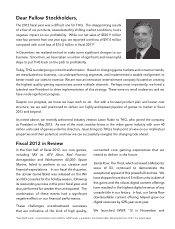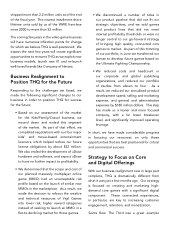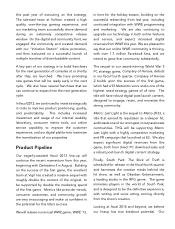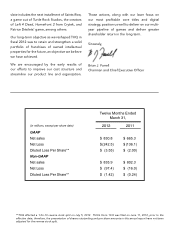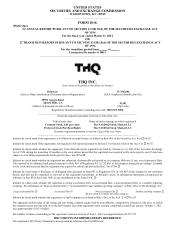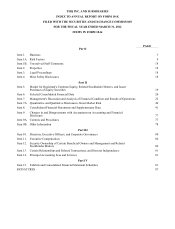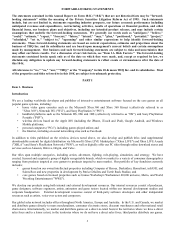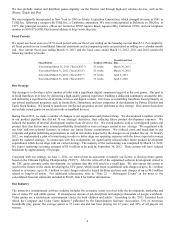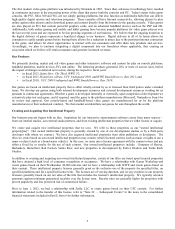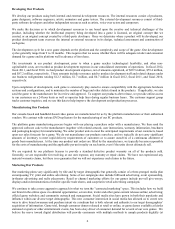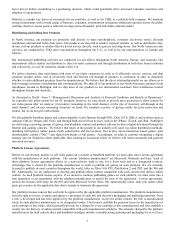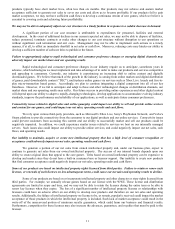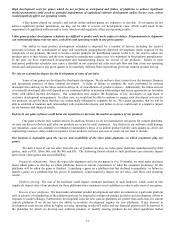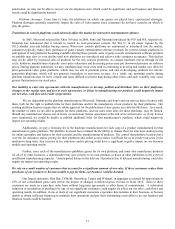THQ 2012 Annual Report Download - page 12
Download and view the complete annual report
Please find page 12 of the 2012 THQ annual report below. You can navigate through the pages in the report by either clicking on the pages listed below, or by using the keyword search tool below to find specific information within the annual report.
4
We also globally market and distribute games digitally via the Internet and through high-end wireless devices, such as the
iPhone, iTouch and iPad.
We were originally incorporated in New York in 1989 as Trinity Acquisition Corporation, which changed its name in 1991 to
T.HQ, Inc. following a merger with THQ, Inc., a California corporation. We were reincorporated in Delaware as THQ Inc. in
1997. Our principal executive offices are located at 29903 Agoura Road, Agoura Hills, California 91301, and our telephone
number is (818) 871-5000. Our Internet address is http://www.thq.com.
Fiscal Periods
We report our fiscal year on a 52/53-week period with our fiscal year ending on the Saturday nearest March 31. For simplicity,
all fiscal periods in our consolidated financial statements and accompanying notes are presented as ending on a calendar month
end. Our current fiscal year ending March 31, 2013 and the fiscal years ended March 31, 2012, 2011 and 2010 contain the
following number of weeks:
Fiscal Period Number of Weeks
Fiscal Period End
Date
Year endin
g
March 31, 2013
(
"fiscal 2013"
)
52 weeks March 30, 2013
Year ended March 31, 2012
(
"fiscal 2012"
)
52 weeks March 31, 2012
Year ended March 31, 2011
(
"fiscal 2011"
)
52 weeks A
p
ril 2, 2011
Year ended March 31, 2010
(
"fiscal 2010"
)
53 weeks A
p
ril 3, 2010
Our Strategy
Our strategy is to develop a select number of titles with a significant digital component targeted at the core gamer. Our goal is
to build franchises over time, by delivering a high-quality gaming experience, building a dedicated community around the title,
and delivering a significant level of online services and digital content. Our focus is on building franchises based primarily on
our owned intellectual properties such as Saints Row, Homefront, and new properties in development by Patrice Désilets and
Turtle Rock Studios. We intend to launch new intellectual properties on new platforms as they emerge. Our current focus does
not include casual games on social networks or handheld devices.
During fiscal 2012, we made a number of changes to our organization and product lineup. We discontinued a number of titles
in our product pipeline that did not fit our strategic objectives, thus reducing future product development expenses. We
reduced the number of internal development studios from eleven to five. We exited markets, sold or reconfigured games and
product lines that did not meet internal profitability thresholds or were no longer central to our strategy. We negotiated with
our kids' and movie-based licensors to reduce our future license commitments. We reduced costs and headcount in our
corporate and global publishing organizations as well as our studios impacted by the changes in our product line-up. In January
2012, we implemented a plan of restructuring in order to better align our operating expenses with the lower expected revenues
under the updated strategy. In connection with this realignment, we significantly reduced other future product development
expenditures which do not align with our current strategy. The majority of the restructuring was completed by March 31, 2012.
We expect remaining severance amounts of $5.0 million to be paid by September 30, 2012. These actions will have reduced
headcount by approximately 370 people.
Consistent with our strategy, on June 1, 2012, we entered into an agreement to transfer our license to develop future games
based on the Ultimate Fighting Championship ("UFC"). After the write-off of the capitalized software development related to
the UFC game currently under development, we estimate that this will result in a small gain. We also expect this action to
result in the closure of the studio developing the UFC game, which could result in additional cash charges of up to $1.1 million
related to severance, up to $1.3 million in cash charges related to leased facilities and non-cash charges of up to $0.5 million
related to long-lived assets. For additional information, refer to "Note 22 — Subsequent Events" in the notes to the
consolidated financial statements included in Part II, Item 8 for further information.
Our Industry
The interactive entertainment software industry includes the economic sector involved with the development, marketing and
sale of video, PC and online games. It encompasses dozens of job disciplines and employs thousands of people worldwide.
Video games are a mainstream entertainment choice for both children and adults. According to the "2011 Essential Facts
About the Computer and Video Game Industry" published by the Entertainment Software Association, 72% of American
households play games; the average gamer is 37 years old and has been playing for 12 years; and 42% of all players are
women.



